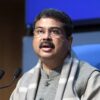Narayana Murthy suggests allocating $1 billion annually for teacher training
Renowned software visionary N. R. Narayana Murthy has proposed a groundbreaking initiative that involves an annual investment of USD one billion to train school teachers. The visionary plan envisions engaging 10,000 retired highly accomplished educators, both from the developed world and India, with a focus on STEM fields (Science, Technology, Engineering, and Mathematics).
Murthy underscored that while this course of action is a significant step, it is by no means a comprehensive solution. In his impassioned plea, he emphasized the imperative to show increased respect to educators, advocating for better salaries and improved facilities. Recognizing their pivotal role as role models for the youth, he highlighted the establishment of the Infosys Prize in 2009 as a modest contribution to advancing the cause of research in India.
To expedite the outcomes of the National Education Policy (NEP), Murthy suggested a proactive approach—inviting 10,000 retired highly accomplished teachers from diverse backgrounds to collaborate in creating 2,500 “Train the Teacher” colleges. These institutions would be strategically distributed across the country’s 28 states and eight union territories.
Expanding on the proposed training program, Murthy advocated for a year-long duration. During a press conference where the Infosys Science Foundation unveiled the Infosys Prize 2023 across six categories, he explained that a group of four trainers could potentially train 100 primary and 100 secondary school teachers annually. By adopting this method, it would be possible to train an impressive 250,000 primary school teachers and an equivalent number of secondary school teachers each year. Moreover, he envisioned that these trained Indian teachers could evolve into trainers themselves over a five-year period.
Addressing the financial aspect of the ambitious plan, Murthy proposed an annual payment of USD 100,000 for each retired teacher involved. He estimated that this twenty-year program would incur an annual cost of USD one billion, amounting to USD 20 billion over two decades. Despite the seemingly substantial financial commitment, he assured that for a nation aspiring to reach a GDP of USD five trillion, the investment would not pose an overwhelming burden.
In emphasizing the importance of this initiative, Murthy drew upon the words of Derek Bok, a former President of Harvard University, who asserted, “If you think education is expensive, try ignorance.”
When questioned about the Infosys Science Foundation’s stance on making a robust recommendation regarding teacher training and related expenditure, especially in light of increased allocations on freebies by some governments coupled with budget cuts in science and R&D, Murthy asserted that his suggestion was made with the genuine intention of bettering the country. He expressed confidence that a panel of experts would evaluate and decide on the viability of the proposal.
Gopalakrishnan, another Infosys co-founder and the President of the Board of Trustees of the foundation, supported Murthy’s proposition. He emphasized the need for a different approach as the country’s GDP grows, especially considering the evolving landscape outlined in the National Education Policy 2020. Gopalakrishnan stressed the importance of not just making recommendations but ensuring the swift and effective implementation of policies.
In his comprehensive remarks, Murthy delved into the four stages of the invention and innovation lifecycle of a nation, asserting that progress occurs as countries advance from stage one to stage four through education and research. While lauding India’s achievements in various domains, including atomic energy, space exploration, vaccine production and distribution, the green revolution, electric cars, and generic medicines, Murthy pointed out that the nation is still in stage one in critical areas such as the design of livable cities, pollution management, traffic management, and providing clean and safe water.
Murthy called for India to aspire to reach stage four in every area affecting the lives of its poorest citizens, even in the remotest parts of the country. To achieve this, he underscored the imperative of enhancing the quality of research and education in higher learning institutions. This involves generating innovative ideas and ensuring their rapid and high-quality implementation.
Highlighting the essence of excellence, Murthy stressed the importance of cultivating a culture of high aspiration, fostering curious and inquiring minds, instilling a desire to achieve the best global standard of work productivity, maintaining stringent discipline and hard work, and adopting the mindset of a nation ready to learn from better-performing cultures.
In conclusion, Murthy commended the initiation of the National Education Policy, expressing his satisfaction that the journey towards improvement had commenced. His multifaceted proposal, spanning teacher training, research, and education quality enhancement, reflects a holistic vision for advancing India on the global stage.
Also read: Sudha Murthy, Shankar Mahadevan on board the high power committee to redesign NCERT textbooks

















Add comment